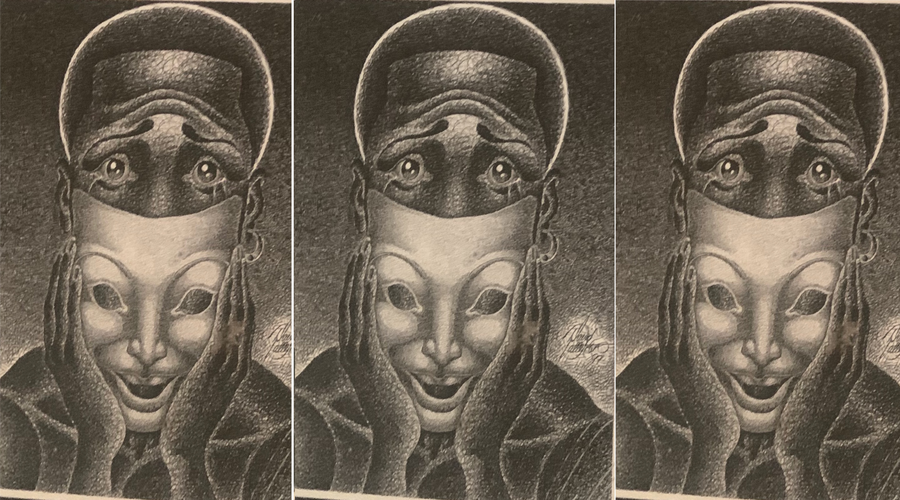
I’ve been wanting to do a Black mental health post since July 1. I even set a calendar alert to remind me. But the way my 2020 mental health was set up at the time, I could barely pull my shit together on my own. It took my all to just give a little. It was at that time I decided to stop lying to myself, and to stop lying to other people, when asked “how are you”. We are so programed to automatically say “I’m fine” even though we really aren’t. It is not until we say those words aloud that we realize how untrue they really are. Once I stopped doing that, I noticed that the people I spoke with stopped doing it to. When they asked “How are you” and I start to say I am fine and then tell them that I’ve actually really been struggling to pull it together, there is usually a sigh of relief, like the room is feeling back up with air and we can drop the mask of normalcy because nothing about what we are living through is normal. It is then that we can unburden ourselves and have genuine conversations about how we are really feeling and not how we want people to believe we are feeling.
To be clear, I am not having these downloads with just everyone. Only those I feel safe around. Trust! One time I asked the cashier at the CVS how she was doing and she told me that not only wasn’t she doing well but that she was about to be homeless and didn’t know what she was going to do. I was not expecting that but could appreciate her honesty. Sis was clearly going through it. And now, so are all of us. These times make the question “How are you doing” even more meaningful, now more than ever. It is not a pleasantry. No. It is a genuine check in. How are you doing? Like for real? I digress.

Today, after witnessing the exploitation of a Black mental health episode, I felt motivated to put something together for those who are struggling and for those who need resources.
Black mental health matters and right now 2020 is really trying-the-fuck out-of-us with no end in sight.
If you are struggling, please know you are NOT alone. If you need help, please use the resources made available below. We are all we got and we have to make sure we are here for each other and are able to lean on one another through such trying times.
View this post on Instagram
July is Bebe Moore Campbell Minority Mental Health Awareness Month & Minority Mental Health Month. Mental illness is not taboo. We need to have these conversations. Our lives & wellbeing literally depend on it! The Health and Human Services Office of Minority Health states that “Blacks are 20% more likely to experience serious mental health problems than the general population. Common mental health disorders among Blacks include:
• Major depression
• Attention deficit hyperactivity disorder (ADHD)
• Suicide, among young African American men
• Posttraumatic stress disorder (PTSD), because Blacks are more likely to be victims of violent crime”
According to The National Alliance of Mental Illness (NAMI) , reasons preventing black people from seeking out & receiving quality treatment are as follows:
•Lack Of Information & Misunderstanding About Mental Health
•Faith, Spirituality And Community
• (Rightful*) Reluctance And Inability To Access Mental Health Services
•Medications
• Provider Bias And Inequality Of Care
• Finding The Right Provider For You
• Cultural Competence In Service Delivery

Bebe Moore Campbell
Bebe Moore Campbell was a Best Selling Author, teacher, and Mental Health Advocate, having had a bipolar family member. She co-founded a NAMI chapter in Inglewood, CA. Her 2005 novel “72 Hour Hold” “focused on an adult daughter and a family’s experience with the onset of mental illness”.

Bebe Moore Campbell and daughter Maia Campbell
Campbell died from brain cancer in 2006. She was 56. She once compared mental illness to slavery saying: “Bottom line: you can’t get out of either one of them alone. You absolutely need help. In the same way that slavery had absolute control over human beings, mental illness has absolute control over human beings, & in fact, turns many people into completely different people”.

Here are some resources if you find yourself in a dark space.
National Alliance on Mental Illness (NAMI) – NAMI HELPLINE • 800-950-NAMI • [email protected] Crisis Text Line – NAMI to 741-741Connect with a trained crisis counselor to receive free, 24/7 crisis support via text message.
Sharing Hope: An African American Guide to Mental Health
African Americans With Anxiety: How to Overcome Unique Obstacles
We Need to Normalize Mental Health Care in the Black Community
Black Therapy Love (App) – a place to interact with therapists, counselors, and coaches to open the dialogue and bridge the gap between mental health professionals and our community
The Safe Place (App) – The Safe Place” Is a Minority Mental Health App geared towards the Black Community.
